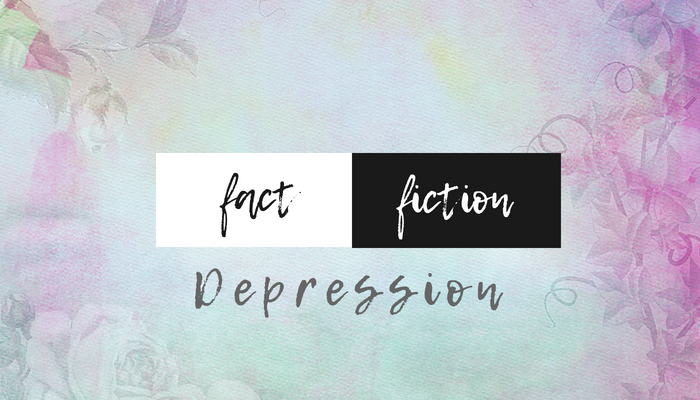In this post, I will be taking a look at some statements people make with regards to depression, and stating whether or not they are fact or fiction. These statements will be answered in my opinion and through professional research. I am not an expert, but suffering from depression for over ten years taught me a thing or two.
Hard work beats depression
I have been constantly told to throw myself into my work to feel better and challenge myself, but this is actually a myth. Depression affects almost one in six people. Challenging yourself may help those feeling blue, but it’s a different case with those who battle depression on a daily basis. In fact, overworking is a common sign of clinical depression, particularly in men.
Depression is not a real illness
Oh I would write a whole book about this big fat lie! Depression actually a serious condition; it is one of the top causes of disability in many countries around the world. However, depression is often is confused with ordinary sadness. Biological evidence of depression comes from extensive studies of genetics, hormones, nerve cells and brain functioning. When someone is truly depressed, their brain nerves start functioning abnormally.
Depression is simply self-pity
WRONG! Current culture is quick to label anyone who takes a fall as a ‘wuss’. But people with clinical depression are not lazy or feeling sorry for themselves (oh the many times I was told this… even by family!) Nor can they ‘”cast off” their depression away. As said previously, depression is a medical illness, a problem related to a shift in brain nerves and fluids. Like any other illness, it usually improves with treatment, time and patience.
Anyone can get depressed
This is obviously true. No matter your profession or background, anyone can develop depression. Unfortunately, depression is twice as likely in women than men, but at the same time, women are more likely to seek help. Depression is often noticed n late teens or early 20s, but an episode can develop at any time in your life. Personal experiences can trigger depression in people who are at risk, or even out of the blue.
It is a gradual and sneaky process
Fact. And this makes it even harder to identify than any sudden illness. A bad day can turn into a rut and you start skipping work or school. Personally, it took me eleven years to seek treatment, because the symptoms started becoming evident at a very slow, gradual pace. Depression can either take up years to be identified, and is therefore a chronic, low-level illness called dysthymia, or it could be a severe and disabling condition.
Help = meds for life
Uhm, WRONG! Before I go into the more professional answer, let me talk personally. I have been on my medication for a little over two years, but have since gone off of them. Despite the buzz about medication, it is simply one of the many remedies used to lift depression. Asking for help won’t necessarily mean you’ll be prescribed medication. Talk therapy can be as helpful as medication in mild to moderate depression. Even if you’re on medication, it’s probably not for the rest of your such as myself!
Depressed people cry a lot
Not necessarily, so I will classify it as fiction. Some people don’t cry or act sad. Instead, they enter a state of emotional “blankness” and may feel worthless or useless at times. Even without any dramatic symptoms, depression left untreated can prevent people from living to the fullest, and this takes a toll on the people around them.
Family history is not destiny
Very true. If depression appears in the family tree, you’re more likely to get it too, but chances are you won’t. My mum was surprised when the doctor gave me the official diagnosis, because the closest anyone from my family had to depression was when Nonno died and Nonna was grieving, but she quickly moved on and got off her medication after just months. People with family history can watch out for early symptoms and take actions accordingly.
Talking makes things worse
This couldn’t be anymore false. In fact,f or me, not talking about it was what made it worse! People used to advised not to talk about their problems. Today, there is evidence that discussions with a professional – be it a GP, psychologist or psychiatrist – can make things much better.
It is tough to treat
NO. Truth be told, people who take action to lift their depression do actually get better. 70% become symptom-free through meds, though not always with the first round. The best combination is to take your meds while undergoing talk therapy.
Hope for a better day is real
YES YES YES. Many would think there’ o hope for a better day. This is part of the illness and NOT a reality. With treatment, positive thinking can gradually replace the negative. Sleep and appetite will improve as well with time. People who see a counsellor are equipped with better coping skills to deal with the stresses in life.



I enjoyed the post. You are right on with facts versus myths. A shame non-sufferers label others. You have to walk in the same or similar shoes to understand ‘yes’ it is an illness and ‘yes’ it is treatable. The hard part is for the sufferer to admit he/she needs help – many suffer in silence.
LikeLiked by 1 person